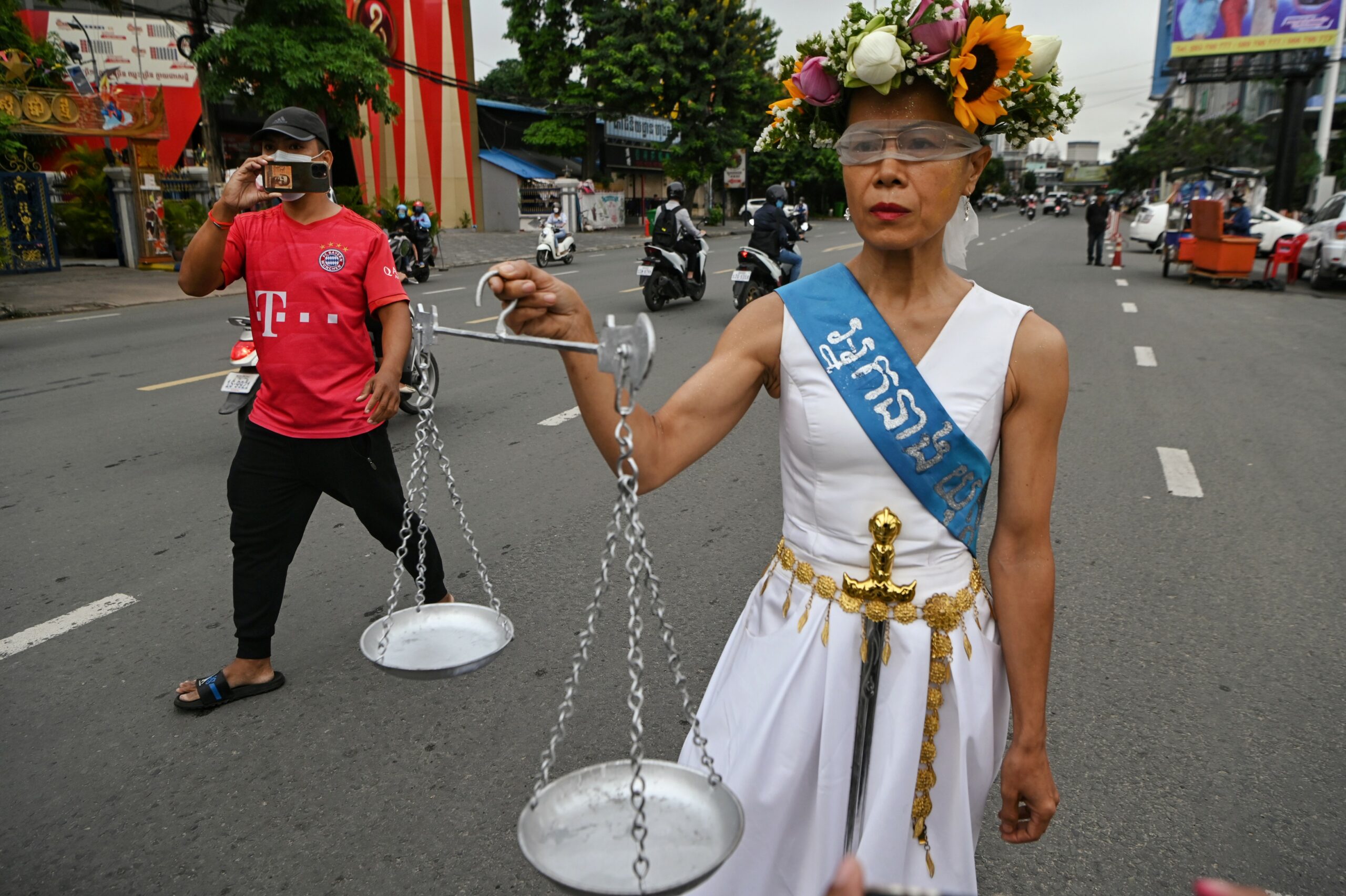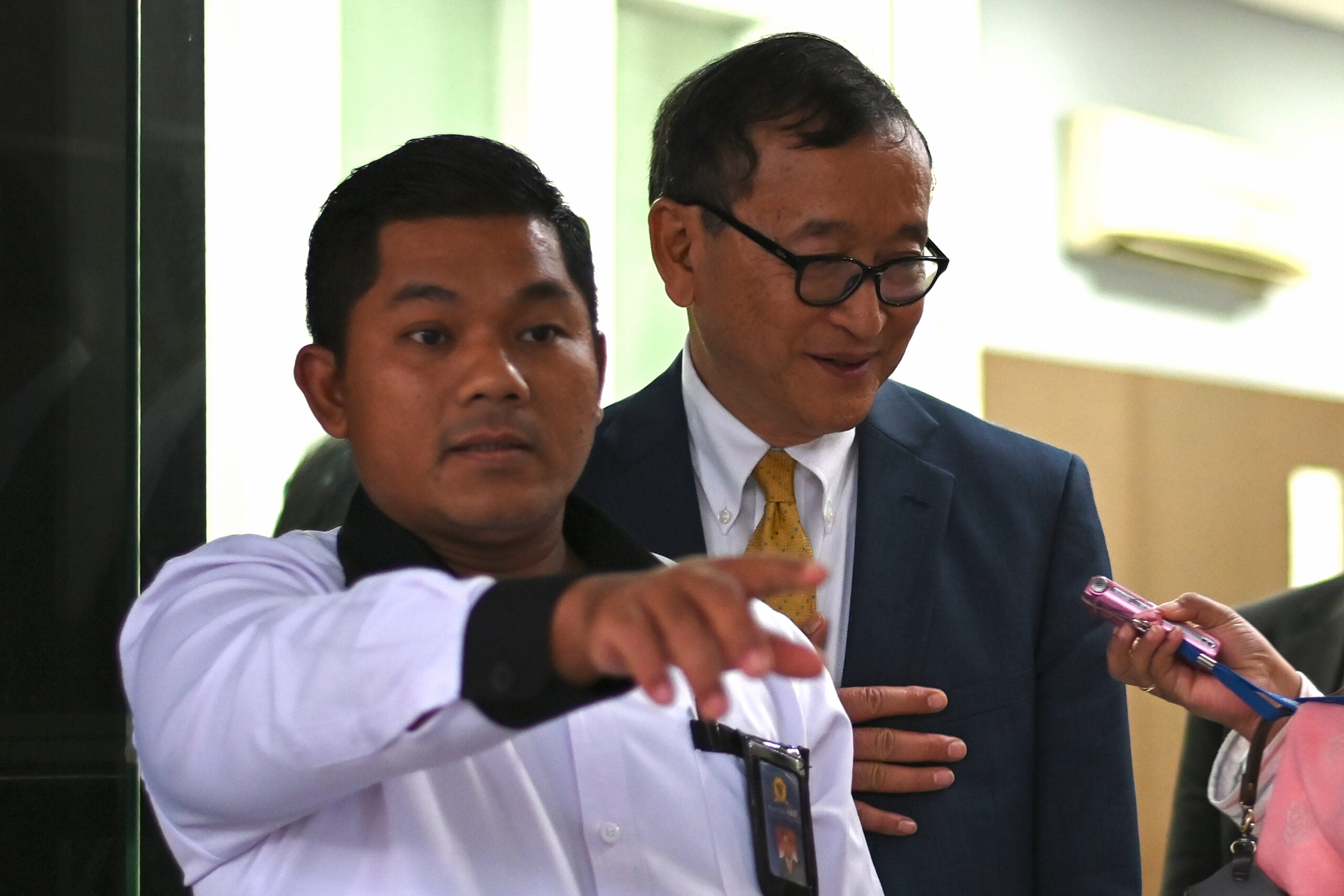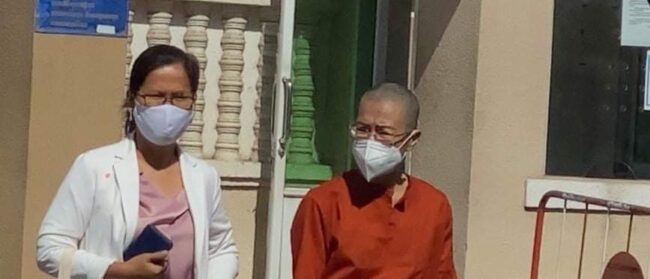Lady Liberty lost her freedom in Cambodia when a court convicted and imprisoned more than 50 opponents of the autocratic regime of Prime Minister Hun Sen.
Cambodian police officers hurried through the street with Theary Seng, whose green Statue of Liberty costume flashed past supporters and media as officers pulled her by the arms to a waiting truck that would carry her into the six-year prison sentence handed down at Phnom Penh Municipal Court on 14 June.
Seng, a Cambodian-American attorney and human rights activist, became a figurehead during the trial of more than 100 people charged with treason and incitement stemming from political activism against the one-party government.
“I am ready and prepared to go to the notorious Cambodian prison for my political opinions, for my beliefs, for my belief in democracy, for my belief in freedom,” Seng told assembled journalists outside the courthouse. “I am ready to pay the price of prison in order that I live out my conscience and my belief in freedom and justice.”
The defendants in the mass trial beginning in November 2020, including 27 prosecuted in absentia, each received prison sentences between five and eight years. Many were targeted due to their political activity associated with the Cambodia National Rescue Party (CNRP), which the Supreme Court of Cambodia disbanded in 2017 as part of a systematic effort by Hun Sen’s Cambodian People’s Party (CPP) to quell opposition following its 2013 election victory.
Seng predicted before the proceedings that the government would “not let me go free.”
“It will be an unfair and unjust verdict because I am innocent, the others charged with me are innocent,” she told reporters.
“This is not acceptable and I will meet her in prison to discuss appealing,” Seng’s attorney, Chuong Choung, said after the sentence was handed down.
The 51-year-old helped draw attention to the trial by speaking loudly against government repression while appearing in a series of eye-catching, emblematic outfits. Her Statue of Liberty ensemble before the verdict included green body paint, “Freedom” written on the crown adorning her shaved head and a large chain draped across her body.

Mardi Seng, Theary’s older brother, said she had “emotionally prepared” for her eventual conviction and transition to prison life for about a year. That included practising meditation techniques with others from Cambodia and elsewhere seen as “prisoners of conscience.”
“The outcome was unavoidable,” he said. “There was no way out of it, unless she left the country, and then she would never come back in. She chose to stay and face imprisonment, which was very courageous. I’m very proud of her.”
Worried family members in the U.S. and Cambodia told him they “didn’t want to see her potential wasted in prison.” Some urged him to convince his sister to leave Cambodia for safety in the U.S., which he considered but eventually rejected.
“I think she has made a decision, and I support her,” Mardi Seng said. “Of all the different people in Cambodia, I just don’t see anyone else that has the same effect as Theary to bring these problems into the open. As a brother, I’m sad, I’m upset, but as a person looking broadly – everything requires sacrifice, and she made a decision to sacrifice herself for the cause.”
Outspoken advocate
“All the steps I’ve taken are really to provoke international attention, to prick the conscience of the public, be it national or international,” Theary Seng said in a previous interview with Southeast Asia Globe.
“I had to show that physically, through my way of dressing, through my attire, through my play, my exaggeration,” she said. “Because it’s a play, so I’m playing a role, which I think now has really helped, to a larger degree, underscore that is political theatre.”
She also sacrificed her dark hair as a form of civic grieving: “In Cambodian culture, when a person shaves his or her head it’s to symbolise mourning, especially during funerals. I am mourning for the country, for the state of Cambodia, in terms of the death of democracy.”
Another trial goal was marrying the tenets of international justice to the Cambodian legal system, which she said was flawed because the courts have tried to disconnect domestic and international law while “the regime likes to use the law as a weapon.”
“When we say international law, it is a part of Cambodian law. It came from outside but we have adopted it,” she said. “When they’re charging me with treason, they’re using law, it’s just their interpretation is really warped.”
Her background and outspoken advocacy have made her a compelling public figure. Born in Phnom Penh in 1971, the Khmer Rouge forced her family to move to Svay Rieng province along the dangerous Vietnamese border. The genocidal regime killed her parents and Seng spent five months in Boeung Rei prison before she and surviving relatives reached Thailand in 1979 and later emigrated to America.
When they’re charging me with treason, they’re using law, it’s just their interpretation is really warped.”
Theary Seng
Her activism in Southeast Asia has included working with various human rights organisations and testifying at the Extraordinary Chambers in the Courts of Cambodia about the Khmer Rouge’s “Brother Number Two,” Nuon Chea.
Seng said in January that she was “thinking seriously about politics” without attaching herself to any specific party. She noted a “power vacuum on the ground” in Cambodian politics due to the inability of former CNRP leaders Sam Rainsy and Mu Sochua to steer the opposition from their exiles in France and the U.S., respectively.
Despite her disavowal of party affiliation, Seng’s civil rights advocacy and government criticism has cast her as a fellow traveller of the CNRP, which has been the only notable opposition group in Hun Sen’s 37-year rule since he ousted the FUNCINPEC party from a coalition government in a 1997 coup. The CPP enjoyed a landslide June win in local commune elections, defeating the Candlelight Party consisting largely of CNRP veterans and supporters.
Chak Sopheap, executive director of the Cambodian Center for Human Rights, said an appeal is unlikely to gain freedom for Seng or the others who received guilty verdicts: “I highly doubt the outcome of the appeal process will achieve justice. Acquittals of human rights defenders and members of the opposition are rare in Cambodia, where criticism and dissent are no longer tolerated.”
Seng’s six-year sentence in particular could be considered a message, Sopheap said in a Southeast Asia Globe interview following the verdict.
“Due to her outspokenness, her creative ways to criticise the ruling party and her bravery in standing up to injustice, Theary Seng has become a thorn in the [government’s] side and an inspiration to many,” she said. “It is therefore entirely possible that her conviction and sentence are meant to have a chilling effect and discourage anyone thinking of following into her footsteps.”
Sentences condemned

Rainsy, whose eponymous party merged with the Human Rights Party to form the CNRP in 2012, attempted to reinforce the image of a sham trial in a tweet about the 14 June sentencing, in which he received an eight-year prison sentence in absentia.
“As I am the principal target of the Kangaroo Court acting under the orders of Hun Sen,” Rainsy wrote, “why do the authorities not try to arrest me by allowing me to return to Cambodia as I tried to do in November 2019?”
Sochua said the verdict was part of a broad government strategy to “spread the feeling of fear. They intend to further use that control to ultimately shut down their critics.”
She added that change will require pressure from outside Cambodia: “The international community will need to speak with one voice, together. Statements after statements are not going to make Hun Sen change his mind, there has to be action.”
The mass conviction immediately drew international attention and condemnation, notably from W. Patrick Murphy, the U.S. ambassador to Cambodia.
“We are deeply troubled by today’s verdict against Seng Theary. Freedom of expression and association, and tolerance of dissenting views, are vital components of democracy,” Murphy wrote on Twitter. “We call on Cambodian authorities to release her and other human rights activists from unjust imprisonment.”
Chad Roedemeier, spokesperson for the U.S. embassy in Phnom Penh, said in a statement that the U.S. has “consistently called on Cambodian authorities to stop politically motivated trials, including against U.S. citizen Seng Theary and other human rights defenders, members of the political opposition, journalists, and labor and environmental activists.”
The embassy called for the release of Seng and other imprisoned human rights activists following the “unjust verdicts,” Roedemeier said: “We urge authorities to uphold the Kingdom’s international obligations and protect human rights and fundamental freedoms, including those which are also enshrined in Cambodia’s constitution.”
Phay Siphan, a Cambodian government spokesperson, defended Seng’s sentence and did not anticipate the imprisonment of a dual U.S.-Cambodian citizen would hurt relations with America.
“The court’s measures are based on the law,” he said in an interview with RFA. “Cambodia and the U.S relationship is important… more important than just one person.”
Charles Santiago, a Malaysian MP and chair of ASEAN Parliamentarians for Human Rights, said in a statement, “Using a judiciary that lost any semblance of independence a long time ago, Hun Sen and his government are de facto turning Cambodia into a one-party state in which nobody is safe except those who obediently accept his increasingly dictatorial rule.”
“Both ASEAN and the international community at large should do all they can to support democracy in Cambodia and stop Hun Sen from weaponizing the law and the state apparatus for his own interests,” Santiago said.
Sopheap said the timing of the court’s decision was not random, coming less than 10 days after the CPP’s sweeping victory in local elections: “I believe this verdict acts as a warning to the opposition ahead of the national elections next year and makes it clear that any opposition, regardless of its popularity, is at the mercy of the [government].”
“The court’s decisions show that the Royal Government of Cambodia, not content with having dissolved the CNRP in November 2017, is now hell-bent on making sure a revival is impossible,” she said.
“Despite the RGC’s repeated and bold claims to the contrary, Cambodia is no longer a democratic country and has not been for years,” Sopheap said. “This verdict makes that very clear, and any efforts by the RGC to justify or defend this verdict are morally bankrupt.”
Additional reporting by Jack Brook, Andrew Haffner and Amanda Oon.


